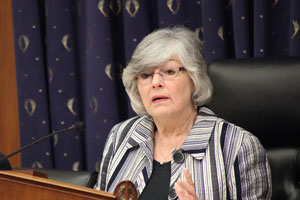Moments after what foes call “Obamacare” passed in the House this spring, Progressive Caucus cochair Rep. Lynn Woolsey (D-Ca.) vowed to bring back the so-called public option. The notion of a government-run insurance program was the biggest rallying point for liberals in the debate, but never made it into the final bill due to a conservative opposition railing against “socialized medicine.” Woolsey has since made good on her promise, introducing a stand-alone public-option bill that has gathered 128 supporters so far, according to the Tribune.
Woolsey and her liberal colleagues admit that there’s dim hope of passage, given the current political climate. And things are likely to be even more difficult in the next Congress, with Democrats predicted to lose upwards of 25 seats—and quite possibly the majority.
But I agree with Jonathan Chait, who argues that a public option is likely to become more popular, not less so, as the country continues to struggle with the escalating costs of health care. Supporters of the option say it will help contain costs and reduce the deficit; Woolsey has touted new data from the Congressional Budget Office that suggest it could save the government some $68 billion between 2014 and 2020, partly due to lower administrative costs.
It’s an argument that may only get more compelling with time. The new health care law does contain some major reforms that will help curb rising costs, including electronic health records, a tax on high-end benefits, and an independent board to evaluate Medicare spending. But many reforms got watered down through months of negotiations, and cost-control is still one of the biggest concerns for health-care wonks. While Republicans will likely cast any failure of the new law to make health care more affordable as a sign that the legislation went too far, it could well be that it didn’t go far enough.
A politically feasible moment for the public option may not come until after 2014, when the law’s new health care insurance exchanges kick in. These will be—shh, don’t tell anyone!—government-regulated marketplaces that give small businesses and some individuals the chance to purchase insurance on their own. If all goes smoothly, and it’s clear the sky hasn’t fallen, then the fear factor of “government-run health care” will have worn off. And the public plan Woolsey proposes might just slot right into the exchanges as another option. Struggling to contain costs, employers and insurance companies are already beginning to restrict the pool of doctors available under certain plans—and consumers may well end up demanding another choice, one less subject to the whims of the private marketplace.










